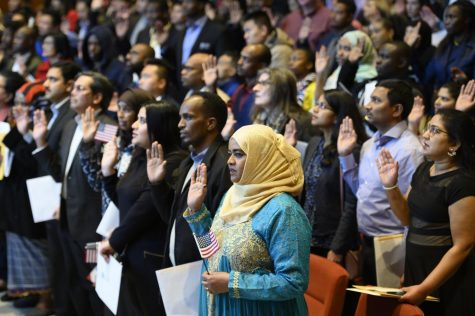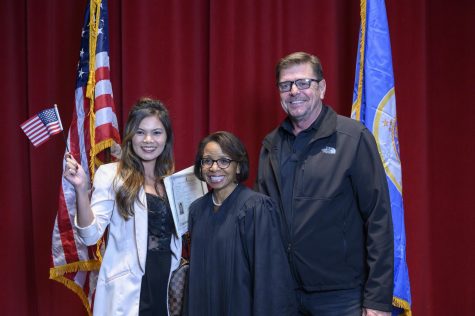What does America mean to you?
The students in US history teacher Molly Ward’s History of Refugee Communities attended the naturalization ceremony hosted in the Huss Center for the Performing Arts Oct. 31 to collect stories of immigration and naturalization.
Fedlu Mohammed: Hollywood America does not exist.
Yona Ketema, Noah Rice

New U.S. citizens recite after the judge during the swearing in ceremony.
Fedlu Mohammed was the first of his family to come to the United States. Sitting alone at a table outside the auditorium, Mohammed, wearing a blue bomber jacket and holding an iPad with a white marble case, waited as his sister was preparing to be naturalized. I shook his hand and asked if my classmate and I could talk to him about why he was there today. Initially guarded and reserved, Mohammed spelled his name for us. When we asked where he was from, he said Ethiopia. I then spoke up and relayed that my parents are from there too. Suddenly a calm came over him as he turned to me and said, “When you came over here I thought, but I didn’t want to assume, you know?”
Back in Ethiopia, his family ran a business, “like what you call a general store here” he said. Mohammed graduated from a university in Ethiopia with a degree in accounting. Learning American culture from movies, he set out to find more opportunities for work. When he got here, he found that his Hollywood America did not exist. No, the government did not pay for everything as he and so many others thought back home. However, upon arrival, he was able to make a deal with Wells Fargo to go back to school and get an American accounting degree. With the condition that he would pay them back by working for them after graduation, Mohammed now finds himself trapped at Wells Fargo in a job not of his choosing. He still works for Wells Fargo, but when talking to him implored us to “pick a major for yourself first.” He had no choice when he came to America. Wells Fargo would give him a job but only if he submitted to their contract.
“Maybe I would have wanted to study nursing… I don’t know,” he said.
As we talked more about his experience here in Minnesota it became clear he is still proud of his home country and wanted us to know it for how he saw it. Half his family still lives in Ethiopia and he goes back for months at a time. Here in Minnesota, he found a welcoming community of other East Africans who understood the beauty of his home country. When talking to non-African people, he found all they knew or thought they knew about Ethiopia was that it was poor and that, “we live in those mud houses.” He then asked us about our cultures and whether we are given the chance to share them with our peers. When we replied no, Mohammed began to speak passionately about the power of educating the people around you about where you come from. It was important to him, that if we left with anything, that we leave with this piece of wisdom.
Anthony Bourdane once said, “It seems that the more places I see and experience, the bigger I realize the world to be. The more I become aware of, the more I realize how relatively little I know of it, how many places I have still to go, how much more there is to learn.” Too often we Americans want to know how immigrants adopted our culture. We asked them questions like what was the most surprising change? Or what was the hardest part of coming to America? Each time we are searching for the same answers of their shock at our seemingly trivial aspects of life. However, we never stop and ask ourselves what we could gain emotionally and culturally from a global exchange of thought. When we open our world up to the greater one in which we exist, we will find a species all searching for the same things. As Mohammed said, “it is important to share,” because when we do we see each other for the core of our being.
Osuji shares joy of naturalization with family
Sophia Heegaard and Anna Snider
What does this day mean to you?
“It means a lot to me because to be a citizen of this great country is an honor, which I have to acknowledge. You know, I have been dreaming of coming here even when I was small,” Michael Osuji said. He accompanied his in-law to the naturalization ceremony.
Osuji, who immigrated from Nigeria and became a naturalized citizen in 2003, knows the system well and helped his in-law through the process. He said, “After holding the green card for 5 years, with a clean record, he (and his in-law) is eligible to become a U.S. citizen.”
Osuji expressed his complete excitement for his in-law and knows how important naturalization day is to everyone who attended on the day.
Natalia: from the Philippines to Dubai to Minnesota
Adam Holod and Henrik Schleisman

“I left the Philippines when I was 23 years old and got a job in Dubai,” Natalia said, “I was a receptionist for a very fancy hotel; the city was very nice. I had a friend who recently got married, she introduced me to one of her friends, a man from Southwest Minnesota who was visiting Dubai for business. We ended up talking more and more, and I decided to go back to the United States with him. When I first arrived in Minnesota, it was so cold that I got sick for a whole month. I ended up marrying and it took two years to get my green card, and then I had to renew it ten years after that. The immigration process was horrible, it took six months just to get an interview, then another six months to become a citizen. It was annoying because my friends all got theirs within two weeks. I do miss my family and I will frequently visit them in the Philippines.”